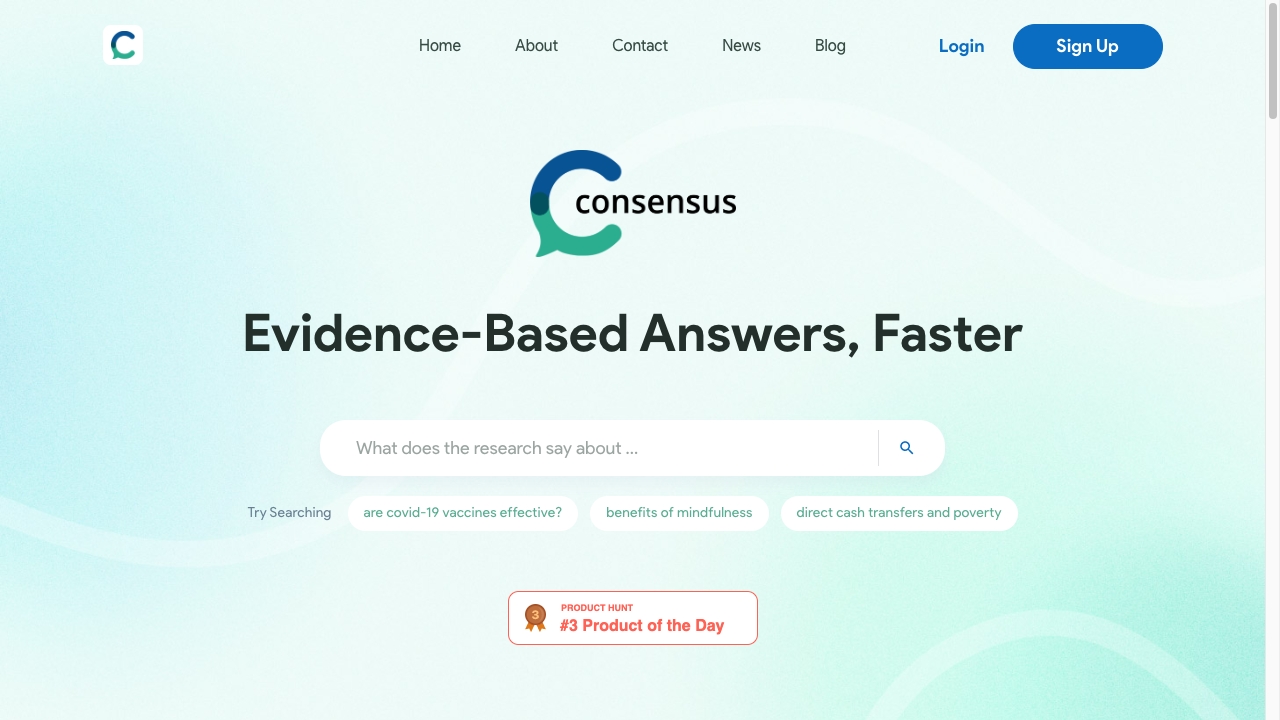- Home
- AI Article Summarizer
- Consensus

Consensus
Open Website-
Tool Introduction:Consensus AI: Evidence-based academic search, instant insights, synthesis
-
Inclusion Date:Oct 21, 2025
-
Social Media & Email:
Tool Information
What is Consensus AI
Consensus AI is an AI-powered academic search engine that extracts, aggregates, and distills findings directly from peer-reviewed scientific research. It helps you discover the most relevant papers quickly and delivers evidence-based summaries and topic synthesis grounded in cited sources. By surfacing patterns, agreements, and important differences across studies, Consensus AI streamlines literature reviews, accelerates evidence gathering, and supports transparent, science-backed decision-making for researchers, students, clinicians, and knowledge workers.
Consensus AI Main Features
- AI academic search: Semantic retrieval focuses on peer-reviewed research to reduce noise from non-scientific web content.
- Evidence-based summaries: Generates concise overviews and key takeaways grounded in citations so you can verify claims.
- Topic synthesis: Aggregates findings across multiple papers to highlight areas of consensus and disagreement.
- Transparent sourcing: Clearly references original studies, supporting traceable and reproducible research workflows.
- Smart query support: Accepts questions and research prompts, enabling natural-language discovery of scientific evidence.
- Filtering and refinement: Narrow results by relevance and recency to focus on the most pertinent literature.
- Research workflow fit: Helps kickstart literature reviews, evidence checks, and rapid background research.
Who Should Use Consensus AI
Consensus AI suits anyone who needs credible, science-backed answers fast. It is useful for academics conducting literature reviews, students validating claims, clinicians and health professionals seeking evidence summaries, policy analysts and think tanks evaluating research, journalists and fact-checkers verifying sources, and product or R&D teams exploring technical topics grounded in peer-reviewed studies.
How to Use Consensus AI
- Enter a research question or topic in natural language (e.g., “Does intermittent fasting improve insulin sensitivity?”).
- Review the AI-generated summary and key findings, noting the cited sources for each statement.
- Refine your query or apply filters (such as recency) to focus the results.
- Open the cited studies to examine methods, sample sizes, and context before drawing conclusions.
- Compare agreements and divergences across papers to assess the strength of the evidence.
- Capture important notes and maintain a reading list to support your literature review or report.
Consensus AI Industry Use Cases
In healthcare, clinicians can rapidly survey evidence on treatment efficacy or diagnostic approaches. Policy teams can synthesize findings across environmental or public health studies to inform recommendations. In technology and product development, teams can evaluate feasibility and risks using peer-reviewed research. Journalists and analysts can fact-check claims by tracing summaries back to original studies.
Consensus AI Pricing
Consensus AI may offer multiple plan options that can include free access to core features and paid tiers for enhanced capacity or advanced tools. Pricing and availability can change; refer to the official website for the latest details, including any free tier or trial periods.
Consensus AI Pros and Cons
Pros:
- Speeds up literature discovery and evidence gathering.
- Summaries are grounded in cited, peer-reviewed sources.
- Highlights consensus and disagreements across studies.
- Reduces noise versus general-purpose web search.
- Supports rigorous, transparent research workflows.
Cons:
- Summaries can miss nuances without reading full texts.
- Coverage may vary across disciplines and niche topics.
- Access to full papers can depend on publisher or institution.
- Not a substitute for systematic review methodology or expert appraisal.
Consensus AI FAQs
-
Is Consensus AI a replacement for a full literature review?
No. It accelerates discovery and synthesis, but you should still evaluate methods, limitations, and full texts when making high-stakes decisions.
-
How does Consensus AI ensure credibility?
It grounds summaries in cited, peer-reviewed research so you can verify claims by inspecting the original studies.
-
Can it access paywalled content?
It provides summaries and citations to published sources. Access to full text depends on publisher policies or your institutional subscriptions.
-
How should I cite information found through Consensus AI?
Cite the original studies referenced by the tool rather than the summary itself, following your field’s citation style.




